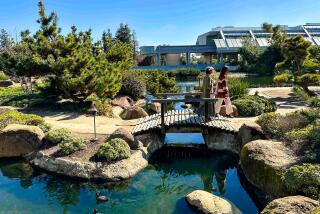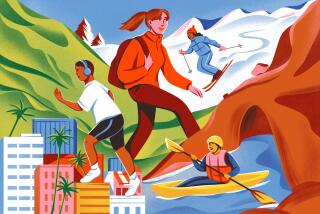Dancers, Joggers, Aerobics Buffs Mingle in Bangkok : For Whirling Social Circus, Try Lumpini Park
- Share via
BANGKOK, Thailand — The tape was playing “Buttons and Bows,” and Tang Kim Hiang, clasping the waist of another middle-aged woman, broke into a fox trot across the asphalt path of Lumpini Park.
As the chorus broke into “East is East and West is West,” other couples joined them. The ladies’ ballroom dancing class was under way, sharing the path with puffing, sweating joggers.
It was 7 a.m., and morning exercises had been under way for more than an hour at Lumpini, Bangkok’s biggest park and a social circus seven days a week.
“For us, this is exercise,” said Tang, 47.
“Yes, for old women,” scoffed a man about Tang’s age. “This is for men,” he said, drawing a blade from a burlap bag and heading for his slow-motion swordplay class on a nearby knoll.
In Southeast Asia, the parks of each country have a distinct flavor. In Manila’s Rizal Park, Filipinos stroll in a Latin promenade. In strait-laced Hanoi, the benches around the Lake of the Restored Sword fill with lovers at nightfall. In Bangkok, East and West meet in Lumpini, and fitness is the attraction.
Bouncy Aerobics Teacher
On a recent weekday morning, just inside the main gate where Buddhist monks wait for their traditional daily gift of rice from passers-by, aerobics instructor Pranee Mudlor, 30, bounced across an elevated platform as her class of 200 or 300 moved in time to an American disco tune. The younger Thais, in flashy exercise outfits, matched their leader’s every move, while the elders, some in their 60s and 70s, caught every second or fourth beat, picking up a foot and putting it down with gusto.
“We’ve been doing these classes for about a year,” said Pranee, an Education Ministry aide. “It’s free, and it keeps people fit.”
Farther on, two rows of beginners were learning the Chinese art of tai chi chuan, a slow, meditative exercise. It looked like an underwater karate class.
“It’s soothing,” said Joan French, an American yoga instructor but a beginner at tai chi chuan. “You have to concentrate to make the moves just right. And it’s a very social thing. We have tea. We get to know each other.”
Helps Ward Off Colds
Six years of it, an older practitioner observed, “and no colds, no doctor.”
Panat Hiranrat, the superintendent of Lumpini, said the park has about 4,000 visitors on weekdays, and there is room to move about. On Saturdays and Sundays, 20,000 descend on the pathways, lakes, lawns and playing fields, and the park approaches madness. Runners barrel through the tai chi chuan lines, soccer balls bounce among the fox-trotters, all-girl school bands march to and fro.
Lumpini is the biggest playground in Bangkok, and about the only one. This city of nearly 6 million people has only five parks: Lumpini, with 144 acres, Chatuchak, with 76, and three small parks in Thonburi, which is almost a separate city across the Chao Phraya River.
Late next year, to mark the 60th birthday of King Bhumibol Adulyadej, Bangkok will inaugurate a new park of 200 acres, but it will be on the eastern fringes of the city.
Lumpini opened in 1925 on land donated by King Rama VI, who stands commemorated in bronze, in military uniform, at the main gate. It is near the central part of the city, not far from the U.S. Embassy.
Park Was Run-Down
Four years ago, it was going to pot. Cars cut through its roadways to avoid some of the city’s notorious traffic, squatters’ shacks encroached on the northern perimeter, sidewalk vendors set up shop. One sold the highly reputed Thai delicacy of whiskey and snake’s blood, and the buyer could choose his own snake.
One by one, these distractions were thrown out of Lumpini; first the cars, then the vendors--”the park is not a market,” Superintendent Panat said--and, finally, a few months ago, the squatters. Lumpini was less colorful but far safer.
Shaded by a grove of Golden Shower trees on a bend of the main lake, beside a path that demon skateboarders could not resist in the United States, a large group loosened up for a session of another exercise form, wai tan kung. Soccer players practiced free kicks nearby, and some elderly gentlemen were swapping stories with their morning tea and peanuts, but the wai tan kung class proceeded without interruption.
This is a favorite of the older generation, not as demanding on the thighs as the sometimes-stressful 81 positions of tai chi chuan. Wai tan kung is like Simon Says, without the penalty. It has only 12 movements, among them shaking a foot, knee-knocking and patty caking.
Group Breaks for Tea
Between sessions, the group can break for tea--it’s brought from home in aluminum urns--and watch the rowboats and pedal boats on the lake, the fountains playing on the waters, or the solo tai chi chuan exponents, moving slowly through their routines, lost in concentration.
Crime is a rare occurrence in Lumpini, according to Superintendent Panat. He has a force of 36 security guards, and police and military patrols pass through occasionally. Cadets from a military academy across the street sometimes march on the park for a bit of close-order drill.
The main danger now is the relentless tide of joggers, dodging through fitness classes like football halfbacks or pounding along five abreast--women and men, Thais, Westerners, Chinese and turbaned Sikhs--a phalanx of thundering feet and T-shirts.
Round and round the 1.4-mile runners’ route, they chug past the park’s attractions and oddities. Past the old Chinese woman juggling steel balls, the old Thai man with the bathroom scales (your weight for a coin); past the few beggars, the women monks in white robes, the two licensed restaurants, the heel-toe walkers, the young men pumping iron at Lumpini’s Muscle Beach, the old boys playing “eating chess” (checkers) and “crossing chess” (Chinese checkers).
Circling round, the runners are the kings of Lumpini’s pathways, spared even Bangkok’s mangy dogs, which are barred from the park and seem to know the rules.
What stops the runners stops everyone. The park’s loudspeakers, after half an hour of Radio Thailand news and another 30 minutes of patriotic political commentary, break into the national anthem precisely at 8 a.m. Everybody freezes.
On the last note, the party’s over. The runners bound off for home and a shower before the workday begins. The exercise classes have a last round of tea before departing. A few old men, fatigued from their efforts or watching those of others, stretch out on stone benches, a newspaper-wrapped brick for a pillow, and snooze in the morning heat.
More to Read
Sign up for Essential California
The most important California stories and recommendations in your inbox every morning.
You may occasionally receive promotional content from the Los Angeles Times.













